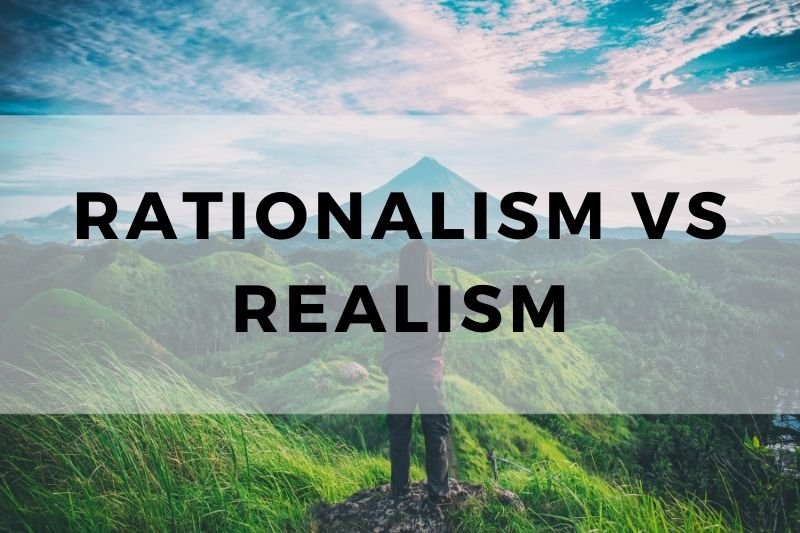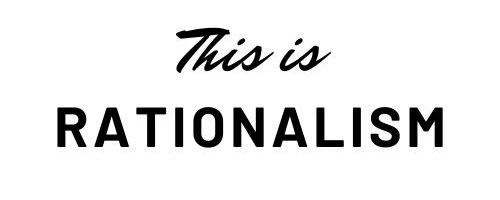
Rationalism and Realism represent two major approaches in philosophy. Both seek to explain how we understand the world, but they differ in their methods and assumptions. Rationalism emphasizes reason as the primary source of knowledge. Realism, on the other hand, focuses on the external world and our ability to perceive it accurately.
This article will explore the key differences between Rationalism vs Realism, their implications for science, and the criticisms of each approach. We will also look at how these philosophies continue to shape contemporary thought.
What is Rationalism?
Rationalism is the belief that reason is the primary source of knowledge. It argues that some truths can be known independently of sensory experience. Rationalists believe that through logic and reasoning, we can gain understanding of the world. Key figures like René Descartes and Baruch Spinoza promoted this view. They argued that the mind plays a central role in shaping our knowledge. According to Rationalism, certain truths are innate or can be discovered through intellectual processes alone, without relying on external observation. This stands in contrast to Empiricism, which emphasizes experience and sensory data as the foundation of knowledge.
What is Realism?
Realism is the view that the world exists independently of our perceptions. It asserts that objects, events, and facts exist regardless of whether we observe or think about them. Realists believe that knowledge comes from interacting with the external world through our senses. Philosophers like Aristotle and John Locke are key figures in this tradition. They argued that our perceptions, while not always perfect, give us reliable access to the external world. Realism emphasizes that reality is objective, and our understanding of it is shaped by our experiences, not by innate ideas or reason alone.
The Core Differences: Rationalism vs Realism
#1. Nature of Knowledge
Rationalism holds that reason and intellect are the primary sources of knowledge. Knowledge is built through reasoning processes, independent of sensory experience. Realism, on the other hand, argues that knowledge comes from our interaction with the external world. It is gained through sensory perception, which provides us with direct access to reality.
#2. Source of Truth
For Rationalists, truth is not dependent on sensory data but is discovered through the mind’s reasoning capabilities. Descartes, for example, believed that certain truths are self-evident and can be arrived at without any external input. Realism posits that truth exists independently of our thoughts or perceptions. It is an objective fact about the world, which can be uncovered through observation and experience.
#3. Role of Experience
Rationalism sees experience as secondary, focusing instead on intellectual faculties like logic and reason. Rationalists argue that the mind can arrive at truth without external sensory input. Realism places significant emphasis on experience. It argues that our senses are vital tools that provide the data necessary for understanding the world, acknowledging that experience shapes our knowledge of reality.
#4. Perception of Reality
Rationalism posits that reality can be understood through reason and mental processes alone. According to Rationalists, the mind’s ability to reason allows it to grasp truths about the world without needing to engage with it directly. In contrast, Realism holds that reality exists outside of our minds and is independent of our perceptions. The world is objective, and our knowledge of it is built through our experiences of it.
#5. Universality of Knowledge
Rationalism often argues that certain forms of knowledge are universal and innate. These truths are accessible through reason, regardless of one’s experiences or external influences. Realism, however, suggests that knowledge is shaped by individual experience. While there may be universal facts about the world, each person’s understanding of these facts is shaped by their sensory encounters and perceptions.
#6. Relationship with Empiricism
Rationalism is typically seen as opposed to Empiricism, which values sensory experience above all else. Rationalists criticize Empiricism for relying too heavily on what can be observed, arguing that reason is the more reliable path to knowledge. Realism, however, aligns more closely with Empiricism. Realists emphasize the importance of perception and experience, arguing that our senses provide a more direct and reliable connection to reality than abstract reasoning.
#7. Influence of the Mind
Rationalism places significant importance on the mind’s role in shaping knowledge. It holds that the mind can reason and deduce truths independently of external reality. For Rationalists, the mind is an active agent that constructs knowledge from innate ideas or logical principles. Realism, in contrast, sees the mind as more passive. It argues that the mind receives knowledge from external sources, primarily through the senses, and does not create or shape reality in the same way.
#8. Method of Inquiry
Rationalism employs deduction and logical reasoning as its primary methods for uncovering truth. This approach often involves working with abstract concepts and using reason to draw conclusions about the nature of reality. Realism, however, uses observation and empirical evidence as the foundation for inquiry. Realists argue that the best way to understand the world is through careful observation, experimentation, and the collection of sensory data.
#9. Key Philosophers
René Descartes and Baruch Spinoza are central figures in the development of Rationalism. Descartes’ famous statement, “Cogito, ergo sum” (“I think, therefore I am”), reflects his belief in reason as the foundation of knowledge. Spinoza also emphasized the role of reason in understanding the universe. In contrast, key figures in Realism include Aristotle, who argued for an objective reality, and John Locke, who believed that knowledge is derived from sensory experience and reflection.
#10. Impact on Science
Rationalism had a profound influence on fields like mathematics and logic, where abstract reasoning is the primary method of inquiry. The emphasis on deduction and intellectual thought also contributed to the development of the scientific method, particularly in areas like physics. Realism, however, has shaped the empirical sciences, such as biology, chemistry, and physics. Realists believe that science must be based on observation, measurement, and experimentation to gain an accurate understanding of the world.
Implications for Science and Knowledge
#1. Role of Observation
In Realism, observation is crucial. Knowledge is derived from what can be perceived through the senses. Science depends on evidence gathered from experiments and observations. Rationalism, however, views observation as secondary. It emphasizes the importance of logical reasoning and abstract principles over sensory experience.
#2. Objectivity of Science
Realism supports the idea that science aims to uncover objective truths about the world. The external world exists independently of our thoughts and perceptions. Rationalism, while also seeking truth, often focuses more on abstract reasoning and theories that may not be directly tied to the physical world.
#3. Foundation of Scientific Theories
Realism provides a foundation for scientific theories that are based on the assumption of an objective, external reality. These theories are tested and refined through observation and experimentation. Rationalism, in contrast, has led to theories that rely more on theoretical or mathematical models, often abstract and removed from direct sensory experience.
#4. Methodology in Scientific Research
Rationalist methods often rely on deduction and reasoning. These approaches can be useful in fields like mathematics, where conclusions are derived logically. Realism, however, emphasizes the scientific method—hypothesis, observation, experimentation, and conclusion—as the best way to understand the physical world.
#5. Progress in Scientific Knowledge
Realism argues that scientific progress is made through incremental improvements in understanding the objective world. As new evidence emerges, theories are adjusted to better reflect reality. Rationalism contributes to scientific progress by providing frameworks for understanding and reasoning about complex systems. However, it does not always address the need for empirical validation.
Criticisms of Rationalism and Realism
Criticisms of Rationalism
- Overemphasis on Reason Rationalism’s focus on reason can neglect the importance of sensory experience. Critics argue that not all knowledge can be derived from the mind alone.
- Dependence on Innate Ideas Rationalism’s reliance on innate ideas has been criticized as unfounded. The idea that certain truths are built into the mind, independent of experience, is controversial.
- Disconnect from Reality Rationalism’s abstract approach can lead to theories detached from the real world. Critics argue that without empirical evidence, ideas may not accurately reflect external reality.
- Limited Scope Rationalism often focuses on intellectual knowledge, overlooking practical, sensory, and emotional knowledge. Critics argue this limits its applicability in understanding the full scope of human experience.
Criticisms of Realism
- Problem of Perception Realism assumes that our perceptions directly reflect reality. Critics argue that perception can be flawed or distorted, raising doubts about the accuracy of knowledge derived from it.
- Relativism and Subjectivity Critics claim that if knowledge is based solely on sensory experience, it may vary greatly between individuals. This leads to subjectivity and relativism, which challenges the idea of objective truth.
- Inaccessibility of Reality Some argue that we can never fully access or understand the objective world because our perceptions are always mediated by our senses. Thus, we are limited in our ability to know reality as it truly is.
- Overreliance on Empirical Evidence Realism’s emphasis on empirical evidence is often criticized for neglecting abstract knowledge that cannot be observed or measured directly. This critique challenges the limits of empiricism in capturing all aspects of knowledge.
Rationalism and Realism in Contemporary Philosophy
In contemporary philosophy, Rationalism and Realism continue to evolve. Modern Rationalists influence fields like cognitive science and artificial intelligence, focusing on innate cognitive structures. Noam Chomsky, for example, emphasizes the role of reason in understanding language and the mind.
Realism has branched into scientific and moral realism. Scientific realism, supported by philosophers like Hilary Putnam, argues that the world described by science exists independently of our perception. However, it faces challenges from relativistic views, like those of Michel Foucault and Thomas Kuhn, which argue that knowledge is shaped by social and cultural factors.
Despite these challenges, both Rationalism and Realism remain important in contemporary debates, particularly in epistemology and philosophy of science, reflecting their continued relevance in understanding knowledge and reality.
Closing Thoughts
Rationalism and Realism offer distinct approaches to understanding knowledge and reality. While Rationalism emphasizes the role of reason and logic, Realism grounds knowledge in sensory experience and the objective existence of the world. Both philosophies have contributed significantly to fields like science, ethics, and epistemology.
Despite their differences, they continue to influence contemporary thought. As we advance in our understanding of the mind, reality, and knowledge, the debate between these two perspectives remains central. Whether through reason or perception, the search for truth continues to shape philosophical inquiry today.
